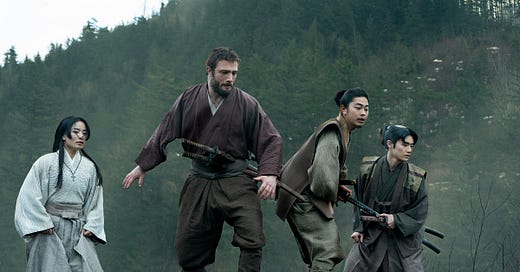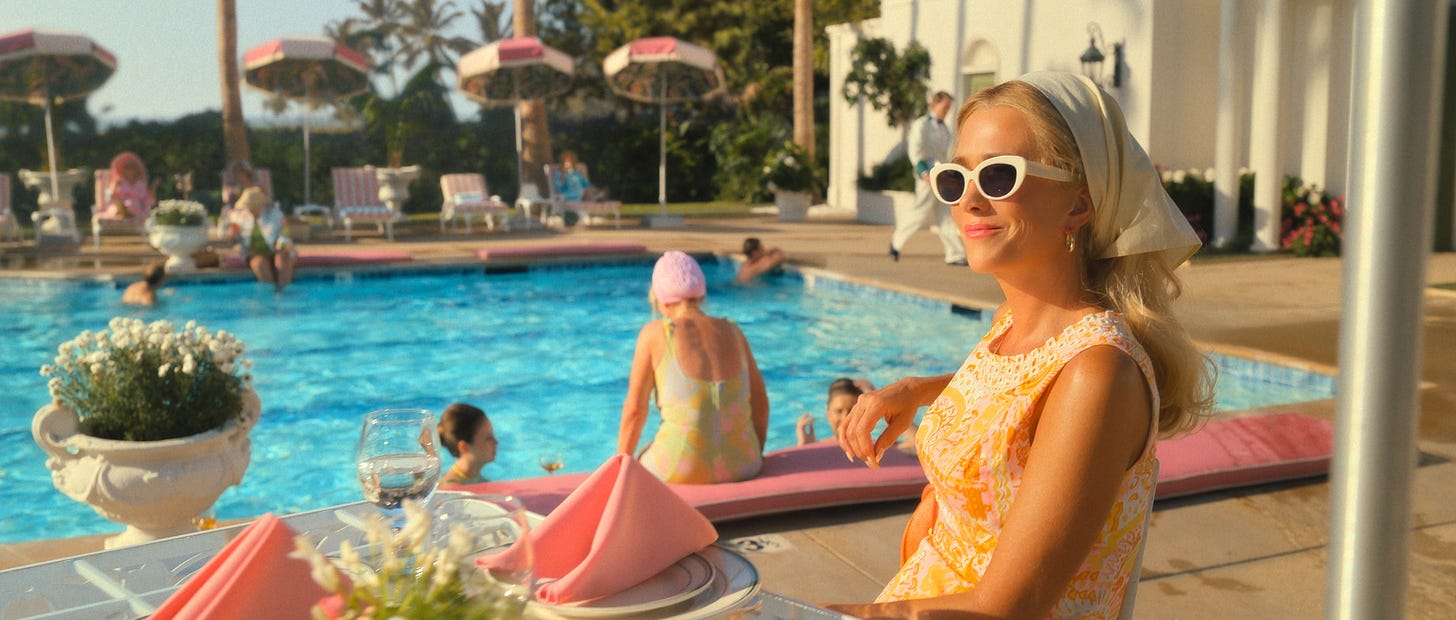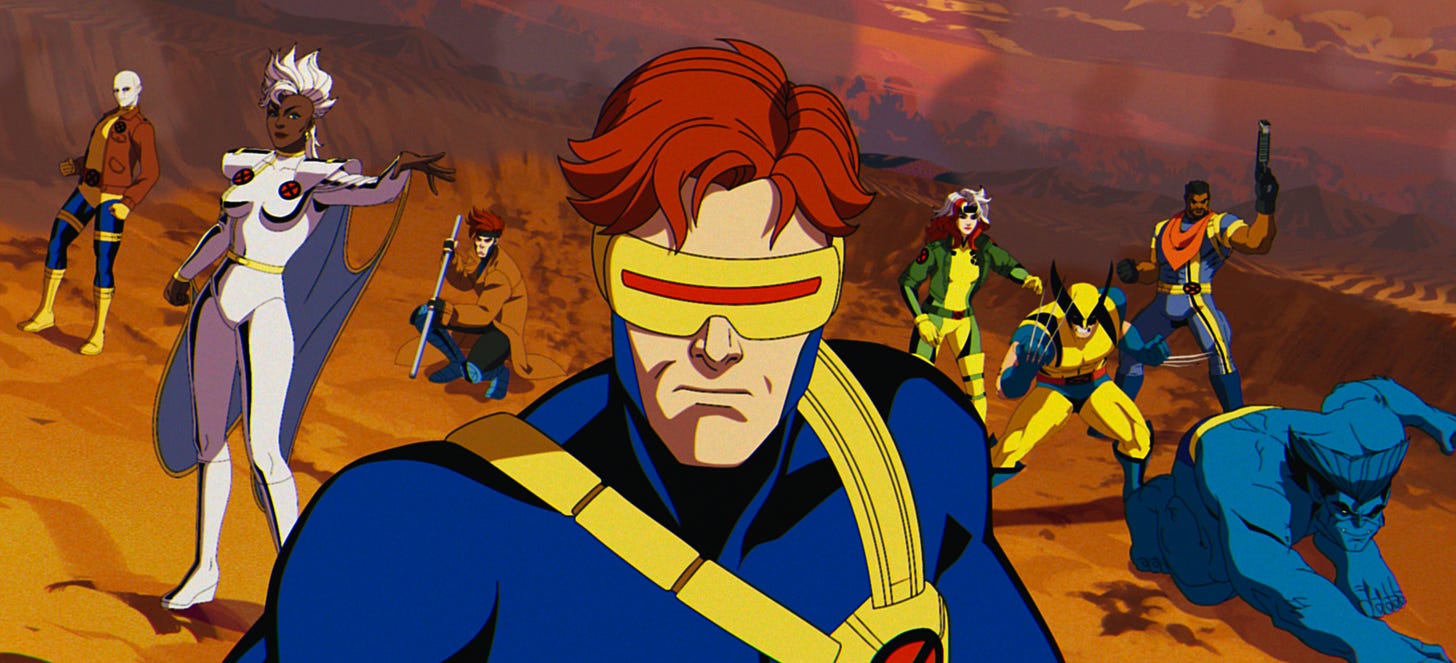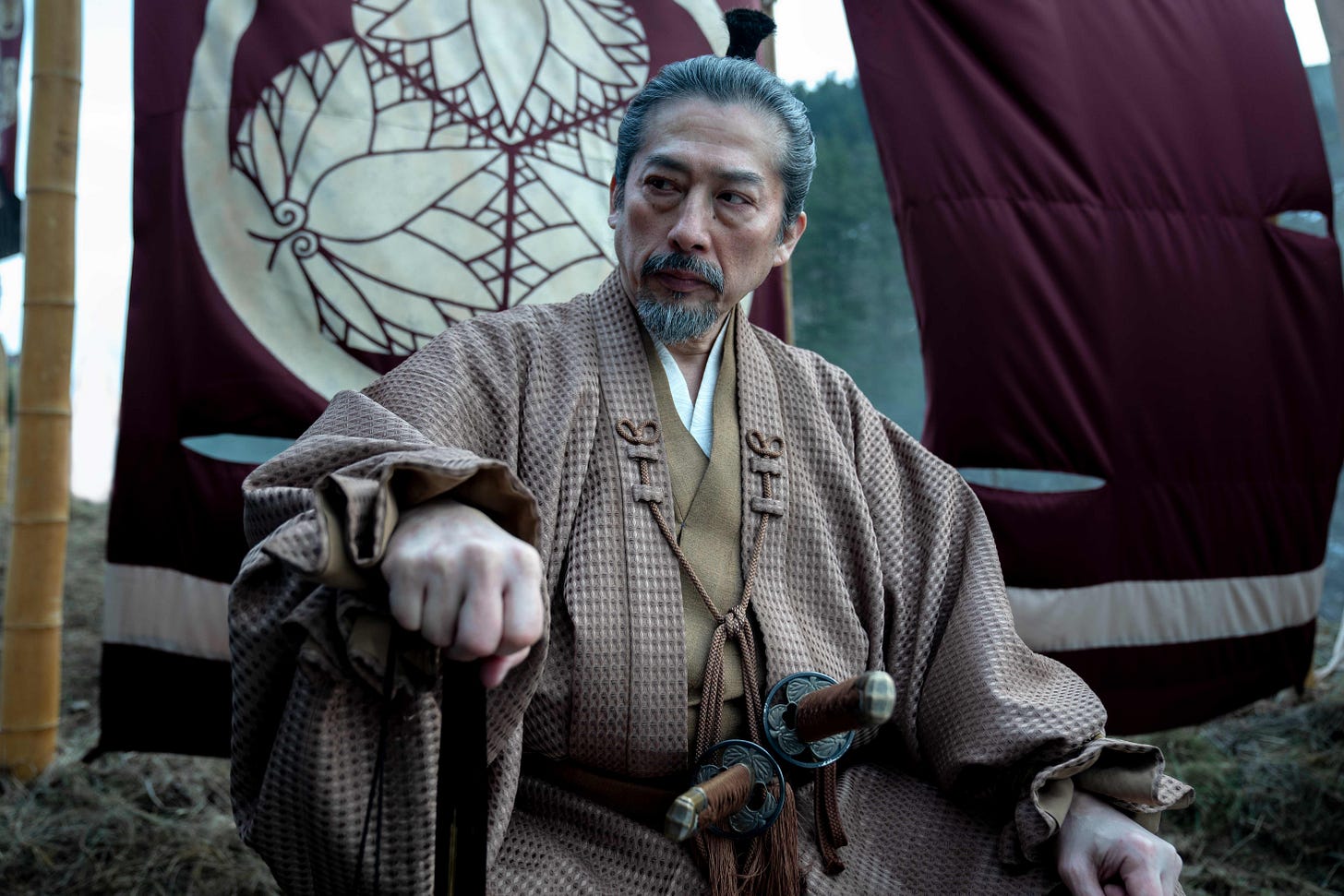I feel the earth move under my feet
A quake hits 'Shōgun,' 'Palm Royale' wastes Kristen Wiig and friends, 'X-Men '97,' and more
This week’s What’s Alan Watching? newsletter coming up just as soon as you hang my pheasant…
Facepalm Royale
I’m working on a magazine feature this week, so had time to only publish one story. It’s unfortunately one of the increasingly rare cases where I Watch So You Don’t Have To. With so much TV out there, I try to avoid spending many hours sitting through things I obviously dislike, and instead devote that time to something I enjoy and can recommend to others. Occasionally, though, exceptions have to be made, and Apple's new period comedy Palm Royale unfortunately qualifies. It is a marvelous collection of talent — Kristen Wiig, Carol Burnett, Allison Janney, and Laura Dern, among many, many others — and a loving recreation of the tacky fashions and decor of well-to-do Miami circa 1969. It is also a complete mess which can’t decide on a tone, can’t decide whether Wiig’s character is ruthless, naive, or somehow both, and barely even made me smile, let alone laugh. In fact, the one running gag I actually found funny is something I’m forbidden from discussing, because it’s on the Do Not Reveal list Apple PR attached to the screeners.
And since Palm Royale isn’t worth discussing beyond what you can find over on Rolling Stone, let me instead vent about those kinds of DNR lists. They were once rarities, confined to only a handful of shows, which were enormous hits and/or run by the most spoiler-phobic individuals in Hollywood. The most infamous example of this was the year critics received the Mad Men season premiere along with a very long DNR that told us to not say that the Sterling Cooper Draper Pryce office now had a second floor. Now, though, it’s an epidemic of unreasonable, counter-productive requests. In this case, I was prevented from discussing one of the few things I enjoyed about a show, all to protect a plot development that will surprise exactly nobody watching. Recently, my buddy Dan Fienberg had to spike an entire, mostly positive, review (of The Walking Dead: Those Who Live) because he wrote it before reading the DNR list, and discovered that he’d have to rewrite nearly all of it to honor the list of things that were considered spoilers — most of them anything but.
I know in some cases these requests come not from the PR teams, but from the showrunners. But regardless of who’s doing it, it’s out of control. For anyone reading this who has any say in the matter, may I make a few humble suggestions?
If something happens in the first 5-10 minutes of an episode, it is not a spoiler.
If something is part of your marketing campaign, it is not a spoiler.
If something is the premise of the show, it is not a spoiler. (Related: if you wait until your seventh episode to reveal the premise, then you could argue that it’s a spoiler. But I in turn would argue that it’s terrible storytelling.)
If a talented actor who often works in television and isn’t transcendently famous is a guest star in your show, it is not a spoiler. (The Bear Season One did this with both Oliver Platt and Joel McHale.)
The year the show/season takes place is not a spoiler, nor is the fact that your story plays out across multiple timelines.
If something is a famous aspect of either a real-life incident or popular book that’s being adapted for TV, it’s not a spoiler. (Call this the It’s Already On Wikipedia Rule.)
And finally, if something would only be surprising to someone who has literally never seen a television show before — like the fact that [REDACTED] happens on Palm Royale — it’s not a spoiler. (FWIW, the REDACTED isn’t the funny thing; it’s something that takes place as a result of REDACTED.)
Conversely, DNR lists frequently ask critics things like, “Do not reveal which character gets shot in the last scene of the season finale.” This is such a reasonable request, it almost doesn’t need to be made. But it’s definitely something I wouldn’t attempt to build a review around.
Odds and/or ends
The one relative blindspot in my TV-watching life came when I was in college, from 1992-96. Obviously, I made time for some things, or else I wouldn’t have been recapping NYPD Blue and thus found a career in TV criticism. But a lot of notable shows of that era went by without me seeing much, or any, of them. Case in point: the Nineties X-Men cartoon, which this week gets a Disney+ revival series, X-Men ‘97. I know the theme song and may have seen an episode or two back in the day, but the only nostalgic attachment I have to it is second-hand, since I read a lot of the Eighties and Nineties X-Men comics it was adapting. Still, enough of my peers love the original that I thought I’d give X-Men ‘97 a try. While I didn’t think it was bad, I came out of the first episode feeling like this was something I’d really only feel invested in if I’d first seen it when I was a kid. Keep in mind, even in my advancing years, I enjoy plenty of new material aimed at people my kids’ age (like Clone Wars), if not younger (like Bluey). For whatever reason, this just felt like the broadest possible characterization for heroes I’d seen presented in a more nuanced fashion at times, and in many cases often, in the comics. (Well, maybe not Gambit.) It’s been getting praise elsewhere, though most of the positive reviews and social media posts I’ve read have been by people who knew and loved the original. If you fall into that category, my guess is you will enjoy it very much.
A number of people have asked for my take on Manhunt, which premiered last week on Apple. As with X-Men, I only watched the first episode before moving on, albeit for different reasons. The actual material about Lincoln’s assassination and the start of the titular manhunt was well-made enough. But my history buff areas trend much more towards mid-20th century (like World War II or the space race) than Lincoln and the Civil War. And I really disliked the bouncing back and forth through time. It’s an issue I’ve written about before, and here seems to exist only so the show can keep featuring Lincoln even after he’s dead. And since Hamish Linklater, an actor I normally like a lot, too often comes across as a bad Lincoln impersonator, that was enough for me to stop watching.
Pete Davidson was supposed to start filming Bupkis Season Two this summer. Instead, he told Peacock that he no longer wanted to continue the show, while declaring, “Of all the work I’ve ever done, Bupkis is by far what I’m most proud of.” As you may recall, I thought the first episode of the autobiographical comedy was one of the worst things I’d seen in quite some time. But everything after that was interesting, and at times excellent. I was curious to see what he’d do next with the show. But if he doesn’t want to keep making something this autobiographical, I get it. Such is life.
With 3 Body Problem now live on Netflix, I thought I’d reshare my review of the TV version of Cixin Liu’s sci-fi epic. As I said a few weeks ago, it’s actually an interesting work of adaptation by the Game of Thrones guys and Alexander Woo; I just think there’s only so much they can do with the source material for television. If you’ve started watching and feel differently, fire away in the comments.
Shōgun recaplet: “Broken to the Fist”
Finally, Shōgun debuted its fifth episode this week, taking us to the miniseries’ halfway mark. This seems like an excellent time to check in on one of the year’s best shows, especially since the episode, “Broken to the Fist,” was so good.
We can start at the end, with the earthquake sequence. As I said in my review, this show isn’t quite at the Game of Thrones level of spectacle, because what could be? But that earthquake came closer than I could have imagined, and left my jaw practically on the floor for several minutes. It’s a trope of quake scenes to have characters indoors while things fall down all around them. Having Blackthorne, Toranaga, and the others standing outside on a hill, with the danger coming entirely from below them, gave it a much different, and more dangerous, feeling than normal. Just stunning.
But as was the case with GoT — which didn’t really have the budget for sweeping visuals and set pieces until it had been around for several seasons — the quake would have meant nothing if we didn’t care about the people imperiled by it. And it’s there that Shōgun is really doing the job. “Broken to the Fist” was loaded with great character moments, particularly Blackthorne and Buntaro’s drunken argument, where Mariko was forced to decide how literally she was going to translate each man’s insults to one another. Worse, bound by the arcane codes of honor in feudal Japan, she had to stand there while Buntaro shot two arrows only millimeters away from her face, just to prove that he could — as both a marksman and a husband with complete control of his wife. It’s a riveting, stomach-turning scene, with Anna Sawai’s face once again speaking volumes for the many conflicts raging just below Mariko’s superhumanly polite surface.
There’s also the subplot about the rotting pheasant. My recollection is that the book leaned even more into the idea that the English and Dutch sailors were filthy in almost every way, and were horrified by the very idea of regular bathing. There’s been a bit of that here, but the culture clash really hits hard with this disgusting bird, where Blackthorne’s misunderstanding of those codes of honor, and how literally his instructions would be taken, leads to tragedy. Cosmo Jarvis is giving a deliberately much bigger performance than Sawai (as many people have pointed out, it’s very Tom Hardy-esque), but that story, and his work, do a lot to bridge the gap between Blackthorne and Mariko, and to force him to recognize just how different his new friends are from the ones he left behind in England.
(And if you’re curious what Blackthorne was attempting to do, it appears that he misunderstood the proper method for aging fowl, since, as I have been told, you are supposed to do it in a space that would keep the bird away from pests and moisture.)
Couple that with the usual terrific work by Hiroyuki Sanada, Tadanobu Asano, and others, this was the episode that really sold me on this as a special show. And it only gets better from here.
That’s it for this week! What did everybody else think?








Great article. I also enjoyed the link here to your piece on nonlinear storytelling. I loved Lost but usually find it annoying. It also bothers me on the page. So many novels use this device now too. Can’t someone just tell us a story so we can focus on that and not on the tricks being played in the storytelling!?
Anna Sawai coming out of seeming nowhere (from an American POV) to do Pachinko, be one of the better parts of Monarch, and then Shogun is wild. I hope to see a lot more from her.